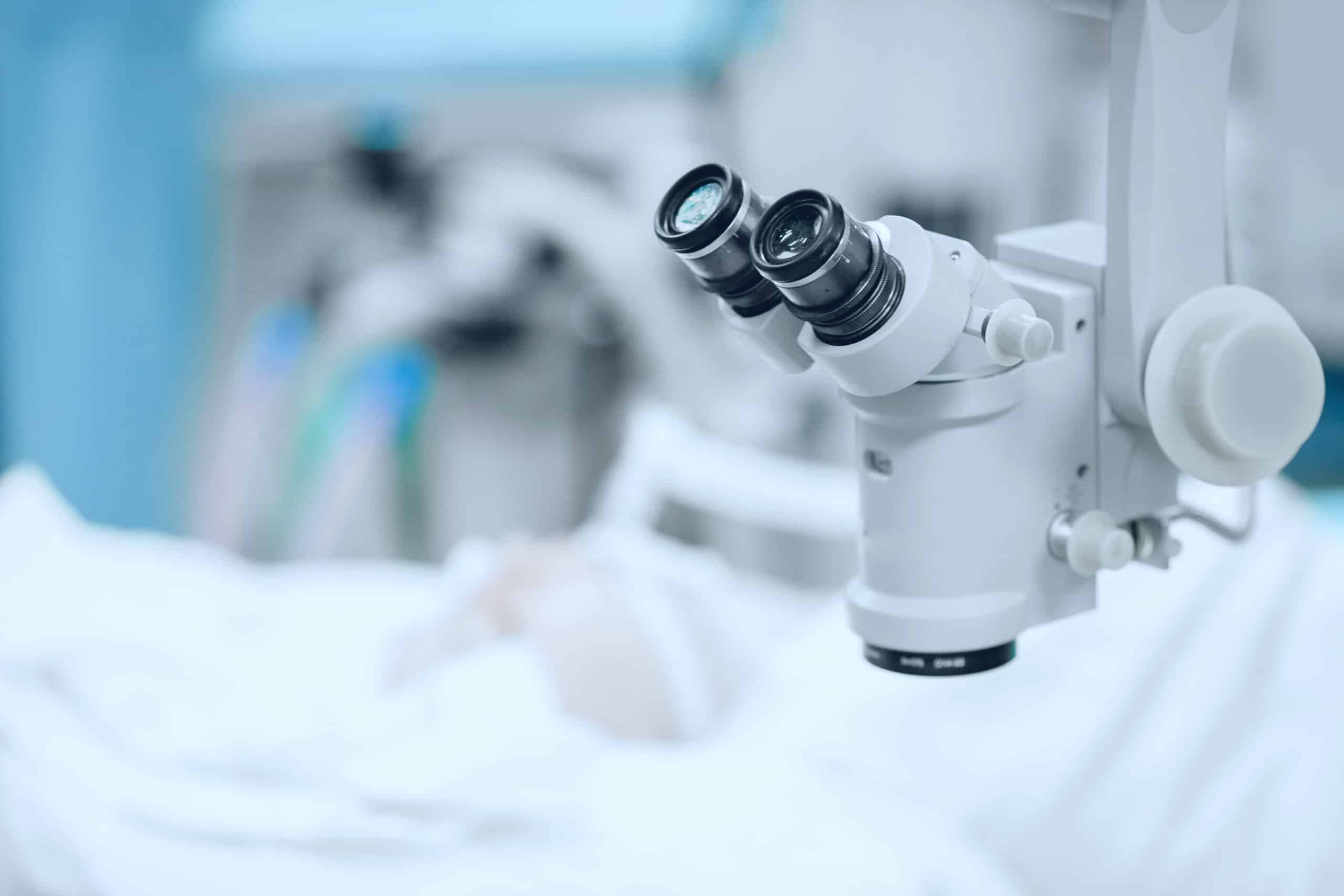Are you tired of relying on eyeglasses or contact lenses for clear vision? If so, you may find LASIK eye surgery to be beneficial. LASIK is today’s most common laser eye surgery to correct refractive vision errors. At Advanced Eye Surgeons, this procedure is performed by board-certified ophthalmologist Dr. Archana Gupta, who specializes in refractive surgery.
What is LASIK Surgery?
LASIK, which stands for laser in-situ keratomileusis, is a popular type of laser eye or refractive surgery that can correct refractive errors in individuals who are farsighted, nearsighted, or have astigmatism. Refractive errors develop when the light rays do not focus properly on the retina. For many patients, laser refractive surgery can reduce or eliminate the need for glasses or contact lenses!
When light does not focus on your retina as it should, you can experience blurred vision, a refractive error. During laser eye surgery in Boca Raton, FL, your cornea will be reshaped so that light focuses on the retina in the back of the eye.
Why You Should Consider LASIK Surgery
LASIK eye surgery offers many benefits over other vision correction methods. Not only does it correct the overall vision, but your vision is also corrected almost immediately following the procedure. While it may take a few weeks for your eyes to adjust to your improved vision, results are permanent. The procedure itself is virtually painless due to the numbing drops used, there are no stitches or bandages needed, and patients can return to their normal schedule within 24 hours.
Dr. Archana Gupta
Cataract Surgeon, Ophthalmologist, Cornea & External Diseases Specialist
Dr. Archana Gupta is a board certified ophthalmologist. She specializes in cataract, cornea, external diseases and refractive surgery.
Benefits of LASIK Surgery
- Improvements in vision problems.
- It is a painless procedure.
- Minimal downtime and no stitches
- Your need for contacts or glasses is greatly reduced or eliminated.
Imagine never having to worry about the burden of contacts or glasses again! Plus, when you no longer need to update your eyeglasses or contact lens prescriptions, you have the potential to save hundreds of dollars each year.
For more information on LASIK surgery and how you can benefit from this laser eye surgery, please see the following pages:
Preparation for LASIK Surgery
If it is decided that you are a good candidate for LASIK, you will meet with our team to speak about what to expect during surgery. A full eye exam will be performed, and we will answer any questions you may have. If you wear contact lenses, you must stop wearing them for at least two weeks before your surgery. Our team will give you specific instructions regarding preparation.
On the day of your laser-assisted procedure, you can take all of your prescribed medications, but we ask that you do not wear eye makeup to your appointment.
The LASIK Procedure
During the LASIK procedure, you will lie in a reclining chair and receive special eye drops to numb your eyes. If you are feeling nervous or anxious about the surgery, you can ask your eye surgeon for a mild sedative to ensure your comfort. Throughout the surgery, you will be asked to focus on a point of light and keep your eyes still.
An instrument will hold your eyelids open, and a suction ring will be placed on your eye. The corneal tissue will be cut, which may cause a slight sensation of pressure. An excimer laser will cut a small hinged flap from the front of your eye, providing better access to the cornea that needs to be reshaped. Using this laser, the cornea is reshaped, and the corneal flap in the front of your eye is put back into place. If needed, this procedure can be performed on both eyes during the same surgery session.
-
"Professional, Excellent and Thorough"
I thought it was very professional. The exam was excellent. Very thorough. The technician was great and the doctor is wonderful. The doctor was very calming.
-
MP
-
"Outstanding in All Respects"
Outstanding in all respects. Dr. Gupta and her staff are true professionals and highly competent. Everything was explained to me in great detail at every step of my procedure and they took great care of me. She is also kind and courteous and really cares about her patients. I strongly recommend Dr. Gupta!!!
-
KB
-
"Staff is Outstanding"
Dr. Gupta is a very skilled doctor who will take the time to explain everything to you... her staff is outstanding as well
-
FC
LASIK Surgery Recovery
After your LASIK procedure, your eyes may feel sensitive and watery, and you may experience a slight gritty or burning sensation. Your vision may also be blurred for a while. It generally takes 2-3 months for your eyes to heal fully and your vision to clear completely. You will have a follow-up appointment at our office a few days after your surgery to check that your eyes are healing correctly. Be sure to follow our aftercare recommendations for the best possible outcomes.
Is LASIK Laser Eye Surgery Right for Me?
If you want to improve your vision to eliminate or reduce the need for glasses and contact lenses, LASIK may be a good option. However, if you are under the age of 18, are pregnant or breastfeeding, have certain eye conditions such as glaucoma or very dry eyes, or have other health issues such as diabetes or lupus, you may not be a good candidate. The best way to determine if laser vision correction aligns with your vision goals is to schedule a consultation at our office, where you can speak with an experienced eye doctor about your options.
LASIK FAQs
Can eyes get worse after Lasik?
While it is uncommon for eyes to get worse after LASIK, no surgical procedure can guarantee permanent results. As mentioned earlier, factors like aging or changes in your eyes structure over time could lead to the need for further vision correction, even after LASIK surgery.
Can I work the day after Lasik?
Many people can return to work one to two days after LASIK surgery, but its crucial to follow your surgeons advice. Most surgeons recommended to take a day or two off work to rest and recover fully. Avoiding activities that might strain your eyes, such as prolonged computer use or reading, is recommended in the days following the surgery. Your eye surgeon will determine the best time to return to work depending on your work visual demands and risk factor.
Can Lasik give you 20 20 Vision?
The intention of Lasik is to provide patients with 20/20 vision upon recovery.
Can you get Lasik If you have astigmatism?
Yes, LASIK can be used to correct astigmatism. Specialized LASIK techniques, such as wavefront-guided LASIK or topography-guided LASIK, can be employed to address astigmatism along with nearsightedness or farsightedness. However, the suitability for LASIK, including astigmatism correction, will be determined during your pre-surgery evaluation with your eye surgeon.
Can you get Lasik in just one eye?
Yes, it is possible to have LASIK surgery on only one eye. This procedure is sometimes performed to correct vision imbalances, such as significant nearsightedness or farsightedness in one eye, or to address issues like anisometropia (a significant difference in prescription between the two eyes).
Can you get Lasik surgery if you wear bifocals?
Yes, individuals who wear bifocals can still be candidates for LASIK surgery, although the specifics can vary depending on individual eye conditions. LASIK surgery is primarily used to correct refractive errors such as myopia (nearsightedness), hyperopia (farsightedness), and astigmatism, which are often conditions that bifocals are used to manage. However, bifocals are typically prescribed for presbyopia, an age-related condition where the eye's lens loses flexibility, making it difficult to focus on close objects. While LASIK can effectively correct distance vision and reduce or eliminate the need for glasses or contact lenses, it does not address presbyopia.
Do I need glasses after Lasik now?
After Lasik, you should not require corrective lenses to see both near and far.
Do you need reading glasses after Lasik?
Whether you will need reading glasses after LASIK surgery largely depends on your age and specific vision needs. LASIK is designed to correct refractive errors such as nearsightedness, farsightedness, and astigmatism, but it does not prevent age-related vision changes, known as presbyopia. As people reach their 40s, presbyopia can cause difficulty with near vision, meaning you might need reading glasses even after a successful LASIK procedure.
Do your eyes look different after Lasik?
Generally, LASIK itself does not change the appearance of the eyes. The procedure primarily involves reshaping the cornea to correct refractive errors such as nearsightedness, farsightedness, or astigmatism. While the function of the eye changes, its outward appearance remains largely the same.
Does Lasik last forever?
LASIK (Laser-Assisted In Situ Keratomileusis) can provide long-lasting vision correction for many people. However, its essential to understand that while the procedure can significantly reduce your dependence on glasses or contact lenses, it doesnt guarantee perfect vision for a lifetime. Over time, factors such as aging or changes in your eyes can lead to the need for reading glasses (presbyopia) or further vision correction. Some individuals might require enhancements or touch-up procedures after their initial LASIK surgery to maintain optimal vision.
How bad do your eyes have to be to get Lasik?
To be eligible for LASIK eye surgery, your prescription generally should fall within specific limits. Typically, LASIK can effectively correct mild to moderate degrees of refractive errors, such as nearsightedness up to around -8.00 diopters, farsightedness up to +3.00 diopters, and astigmatism up to about 3.00 diopters.
How long do you wear glasses after Lasik?
After undergoing LASIK eye surgery, most patients experience significant improvements in their vision within the first 24 to 48 hours. However, some may still need to wear glasses temporarily during the recovery period, which usually lasts a few weeks. This brief period of wearing glasses is generally for specific tasks that require sharp vision, such as reading or night driving, rather than for constant use.
How long does eye surgery take?
Laser eye surgery typically takes between 10 and 15 minutes per eye, depending on the specific procedure being performed. The most common types of laser eye surgery, such as LASIK and PRK, are designed to quickly reshape the cornea to improve vision.
How long is the recovery for Lasik surgery?
The initial recovery period after LASIK is relatively quick. Most people experience improved vision within the first 24-48 hours after the procedure. However, its essential to follow your doctors post-operative instructions, which may include avoiding strenuous activities, refraining from rubbing your eyes, and using prescribed eye drops. Full visual recovery may take a few days to a few weeks, and you will have follow-up appointments with your surgeon to monitor your progress.
How long is vision blurry after Lasik?
After undergoing LASIK surgery, it's common for patients to experience blurry vision as part of the normal healing process. In general, most individuals notice an immediate improvement in vision within the first 24 to 48 hours; however, it is not unusual for some blurriness or fluctuation to persist during the initial healing period. Typically, the majority of patients experience significant improvement in clarity within a week to ten days after the procedure.
What are the requirements for Lasik eye surgery?
The requirements for LASIK surgery can vary depending on the specific clinic and surgeon. Generally, candidates for LASIK should be at least 18 years old, have stable vision prescription for at least one year, have overall good eye health, and have realistic expectations about the outcomes of the surgery. A comprehensive eye examination and consultation with an experienced eye surgeon will determine if you are a suitable candidate for LASIK.
What does Lasik eye surgery do?
During the surgery, a specialized laser is used to reshape the cornea, the clear front part of the eye, allowing light entering the eye to be properly focused onto the retina. This results in clear vision without the need for glasses or contact lenses.
What happens if you blink during laser eye surgery?
During laser eye surgery, such as LASIK, the procedure is designed to accommodate natural reflexes, including blinking. Modern laser systems are equipped with advanced technology that includes a lid speculum to gently hold the eyelids open during the procedure, preventing blinking. Additionally, the lasers used in the surgery have sophisticated tracking systems that monitor eye movements in real-time. If any significant movement occurs, these systems can pause the laser, ensuring the precision and safety of the surgery are maintained throughout the procedure.
What if I accidentally rub my eye after Lasik?
If you accidentally rub your eye shortly after LASIK surgery, there may be a risk of disturbing the corneal flap created during the procedure. The first 24 to 48 hours following LASIK are crucial for the initial healing process, and any disturbance, such as rubbing, could potentially lead to complications like flap displacement or increased discomfort. Should you rub your eye, monitor for any sudden changes in vision, increased pain, or persistent irritation.
Read more LASIK FAQs here
Schedule Your Free Consultation Today
Are you tired of living with glasses or contact lenses and want to achieve clearer vision? If so, LASIK surgery may be right for you. To learn more, contact Advanced Eye Surgeons today!
Related Blogs
5 MINUTE READ |
July 19, 2022
Important Questions to Ask Before Lasik Surgery
Lasik
Read More
5 MINUTE READ |
October 18, 2023
What to Expect After LASIK Surgery
Lasik
Read More
“Everyone deserves to witness the beauty of our world in its full glory.”








